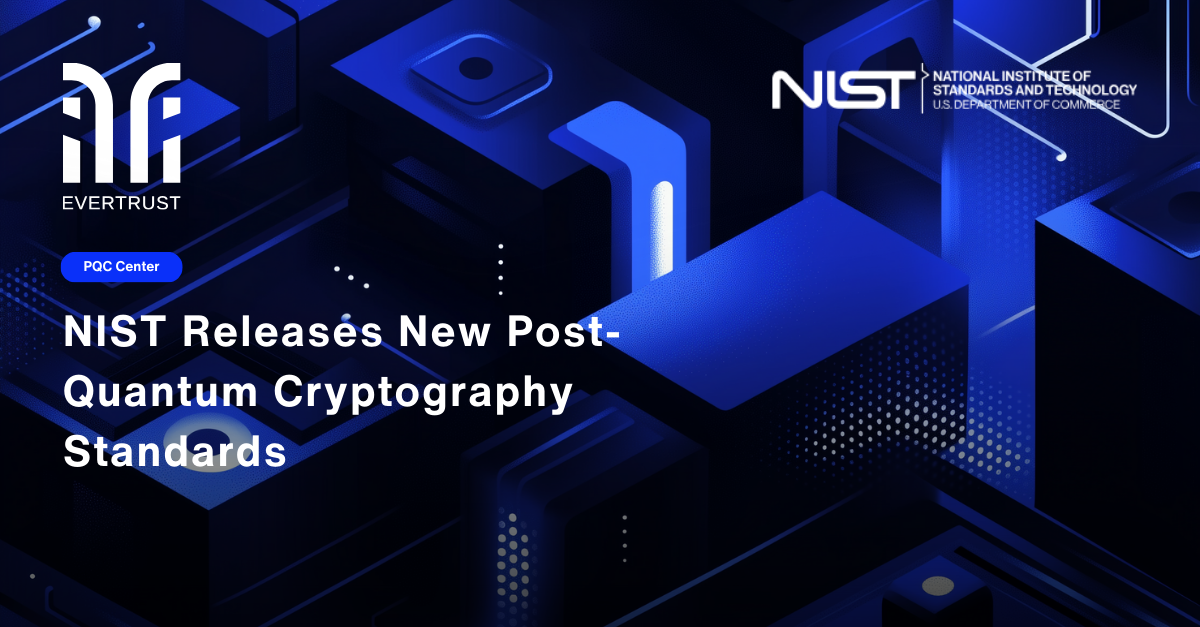Discover NIST’s new Post-Quantum Cryptography standards (FIPS 203, 204, 205) and how Evertrust is preparing to integrate them for enhanced cybersecurity.

The landscape of cybersecurity is constantly evolving, and with the emergence of quantum computing, the stakes have never been higher. Quantum computers have the potential to break traditional encryption methods, posing significant risks to the security of sensitive data. In response to these challenges, the National Institute of Standards and Technology (NIST) has taken a crucial step forward by releasing the final standards for Post-Quantum Cryptography (PQC). This development marks a significant milestone in the ongoing effort to safeguard our digital future.
After years of rigorous research, testing, and collaboration with experts from around the world, NIST has officially released the standards document for Post-Quantum Cryptography. These standards, which were previously known by their algorithmic names—Dilithium, Kyber, and SPHINCS+—are now formally recognized as FIPS 203, FIPS 204, and FIPS 205, respectively. Each of these standards represents a groundbreaking advancement in cryptographic technology, designed to withstand the threats posed by quantum computers.
The new standards are as follows:
FIPS 203 (ML-KEM): Based on the CRYSTALS-KYBER algorithm, this standard focuses on key encapsulation mechanisms, providing a secure method for encrypting communication channels.
FIPS 204 (ML-DSA): Built on the CRYSTALS-Dilithium algorithm, this standard addresses digital signatures, ensuring the authenticity and integrity of digital communications.
FIPS 205 (SLH-DSA): Based on the SPHINCS+ algorithm, this standard also pertains to digital signatures, offering a robust alternative with a unique approach to security.
These standards represent the culmination of years of work and are a testament to the dedication and expertise of the global cryptographic community.
One of the most notable changes in the newly released standards is the introduction of the ability to prehash data before applying these algorithms. This enhancement is particularly significant for scenarios where large documents need to be signed, such as in compliance with the European Union's eIDAS regulation. Prehashing allows for more efficient processing and enhances the practicality of using these algorithms in real-world applications.
For industries that rely heavily on digital signatures, such as finance, healthcare, and government, this development offers a critical advantage. The ability to securely sign large documents with confidence is essential for maintaining trust in digital transactions and communications. However, it’s worth noting that this prehashing feature may be less impactful when it comes to signing certificates, where the data size is typically smaller.
At EVERTRUST, we are excited about the release of these standards and are already working on integrating them into our solutions. Our team is dedicated to staying at the forefront of cybersecurity advancements, and the implementation of PQC is a top priority. We anticipate that the standards for PQC-enabled (hybrid) certificates will be released soon, paving the way for widespread deployment.
The introduction of PQC-enabled certificates will be a game-changer for the industry. These certificates will offer a higher level of security, ensuring that digital identities and communications remain protected even in the face of quantum threats. As we move forward, EVERTRUST will continue to lead the charge in adopting and deploying these cutting-edge technologies, helping our clients navigate the complexities of the post-quantum world.
The release of NIST's PQC standards is a momentous occasion for the cybersecurity community. It represents not only the culmination of years of hard work but also the beginning of a new chapter in digital security. As we celebrate this achievement, we extend our gratitude to everyone involved in the development of these standards, particularly the team at NIST, whose dedication has made this possible.
At EVERTRUST, we are proud to be part of this journey and are committed to ensuring that our solutions remain at the cutting edge of cybersecurity. The future of digital security is here, and with the implementation of these new PQC standards, we are better equipped than ever to protect the integrity and confidentiality of our data.
Let’s embrace this new era of cryptography and look forward to a secure and resilient digital future.